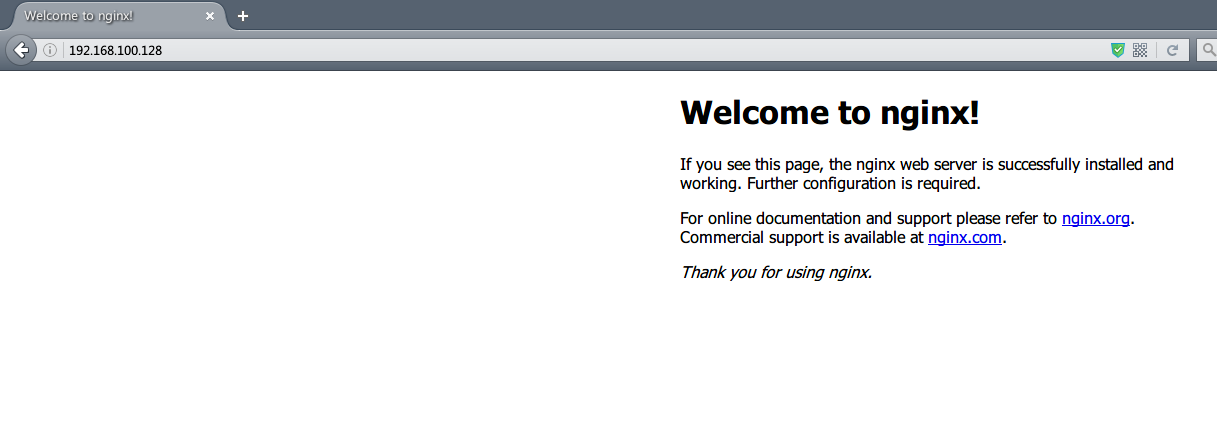在安装nginx前,需要确保系统安装了g++、gcc、openssl-devel、pcre-devel和zlib-devel软件。
[root@localhost ~]# yum -y install gcc-c++ zlib zlib-devel openssl openssl-devel pcre pcre-devel[root@localhost ~]# wget http://nginx.org/download/nginx-1.10.1.tar.gz[root@localhost ~]# tar -zxvf nginx-1.10.1.tar.gz
[root@localhost ~]# cd nginx-1.10.1
[root@localhost nginx-1.10.1]# ./configure --prefix=/usr/local/nginx --with-http_ssl_module上面 --prefix 配置nginx所在目录,--with-http_ssl_module配置nginx支持ssl,配置https会用到。
[root@localhost nginx-1.10.1]# make && make install来看看
[root@localhost nginx-1.10.1]# ll /usr/local/nginx/
total 16
drwxr-xr-x. 2 root root 4096 Sep 9 22:07 conf
drwxr-xr-x. 2 root root 4096 Sep 9 22:07 html
drwxr-xr-x. 2 root root 4096 Sep 9 22:07 logs
drwxr-xr-x. 2 root root 4096 Sep 9 22:07 sbin[root@localhost nginx-1.10.1]# cd /usr/local/nginx/sbin/
[root@localhost sbin]# ./nginx这样就启动nginx,nginx默认监听在80端口,但是我们不要忘了把80端口对外开放。
在 /etc/sysconfig/iptables 中添加80端口
-A INPUT -m state --state NEW -m tcp -p tcp --dport 80 -j ACCEPT保存后重启一下防火墙
[root@localhost sbin]# service iptables restart
iptables: Setting chains to policy ACCEPT: filter [ OK ]
iptables: Flushing firewall rules: [ OK ]
iptables: Unloading modules: [ OK ]
iptables: Applying firewall rules: [ OK ]访问 http://192.168.100.128/ 你将看到
#查询nginx主进程号
[root@localhost sbin]# ps -ef | grep nginx
#停止进程
[root@localhost sbin]# kill -QUIT 主进程号
#快速停止
[root@localhost sbin]# kill -TERM 主进程号
#强制停止
[root@localhost sbin]# pkill -9 nginx[root@localhost ~]# /usr/local/nginx/sbin/nginx -s reload[root@localhost ~]# vim /etc/init.d/nginx将服务脚本粘贴进去
服务脚本
#!/bin/sh
# chkconfig: 2345 85 15
# description:Nginx Server
NGINX_HOME=/usr/local/nginx
NGINX_SBIN=$NGINX_HOME/sbin/nginx
NGINX_CONF=$NGINX_HOME/conf/nginx.conf
NGINX_PID=$NGINX_HOME/logs/nginx.pid
NGINX_NAME="Nginx"
. /etc/rc.d/init.d/functions
if [ ! -f $NGINX_SBIN ]
then
echo "$NGINX_NAME startup: $NGINX_SBIN not exists! "
exit
fi
start() {
$NGINX_SBIN -c $NGINX_CONF
ret=$?
if [ $ret -eq 0 ]; then
action $"Starting $NGINX_NAME: " /bin/true
else
action $"Starting $NGINX_NAME: " /bin/false
fi
}
stop() {
kill `cat $NGINX_PID`
ret=$?
if [ $ret -eq 0 ]; then
action $"Stopping $NGINX_NAME: " /bin/true
else
action $"Stopping $NGINX_NAME: " /bin/false
fi
}
restart() {
stop
start
}
check() {
$NGINX_SBIN -c $NGINX_CONF -t
}
reload() {
kill -HUP `cat $NGINX_PID` && echo "reload success!"
}
relog() {
kill -USR1 `cat $NGINX_PID` && echo "relog success!"
}
case "$1" in
start)
start
;;
stop)
stop
;;
restart)
restart
;;
check|chk)
check
;;
status)
status -p $NGINX_PID
;;
reload)
reload
;;
relog)
relog
;;
*)
echo $"Usage: $0 {start|stop|restart|reload|status|check|relog}"
exit 1
esac给脚本可执行权限
[root@localhost ~]# chmod +x /etc/init.d/nginx然后你就可以使用 service nginx start 的方式启动nginx了
[root@localhost ~]# service nginx
Usage: /etc/init.d/nginx {start|stop|restart|reload|status|check|relog}[root@localhost ~]# chkconfig --add nginx
[root@localhost ~]# chkconfig
auditd 0:off 1:off 2:on 3:on 4:on 5:on 6:off
blk-availability 0:off 1:on 2:on 3:on 4:on 5:on 6:off
crond 0:off 1:off 2:on 3:on 4:on 5:on 6:off
ip6tables 0:off 1:off 2:on 3:on 4:on 5:on 6:off
iptables 0:off 1:off 2:on 3:on 4:on 5:on 6:off
iscsi 0:off 1:off 2:off 3:on 4:on 5:on 6:off
iscsid 0:off 1:off 2:off 3:on 4:on 5:on 6:off
lvm2-monitor 0:off 1:on 2:on 3:on 4:on 5:on 6:off
mdmonitor 0:off 1:off 2:on 3:on 4:on 5:on 6:off
multipathd 0:off 1:off 2:off 3:off 4:off 5:off 6:off
mysqld 0:off 1:off 2:on 3:on 4:on 5:on 6:off
netconsole 0:off 1:off 2:off 3:off 4:off 5:off 6:off
netfs 0:off 1:off 2:off 3:on 4:on 5:on 6:off
network 0:off 1:off 2:on 3:on 4:on 5:on 6:off
nginx 0:off 1:off 2:on 3:on 4:on 5:on 6:off
postfix 0:off 1:off 2:on 3:on 4:on 5:on 6:off
rdisc 0:off 1:off 2:off 3:off 4:off 5:off 6:off
restorecond 0:off 1:off 2:off 3:off 4:off 5:off 6:off
rsyslog 0:off 1:off 2:on 3:on 4:on 5:on 6:off
saslauthd 0:off 1:off 2:off 3:off 4:off 5:off 6:off
sshd 0:off 1:off 2:on 3:on 4:on 5:on 6:off
udev-post 0:off 1:on 2:on 3:on 4:on 5:on 6:off我们可以看到nginx已经被添加到开机启动了。
- 目录
- 上一节: 安装mysql及配置
- 下一节: 安装redis3
